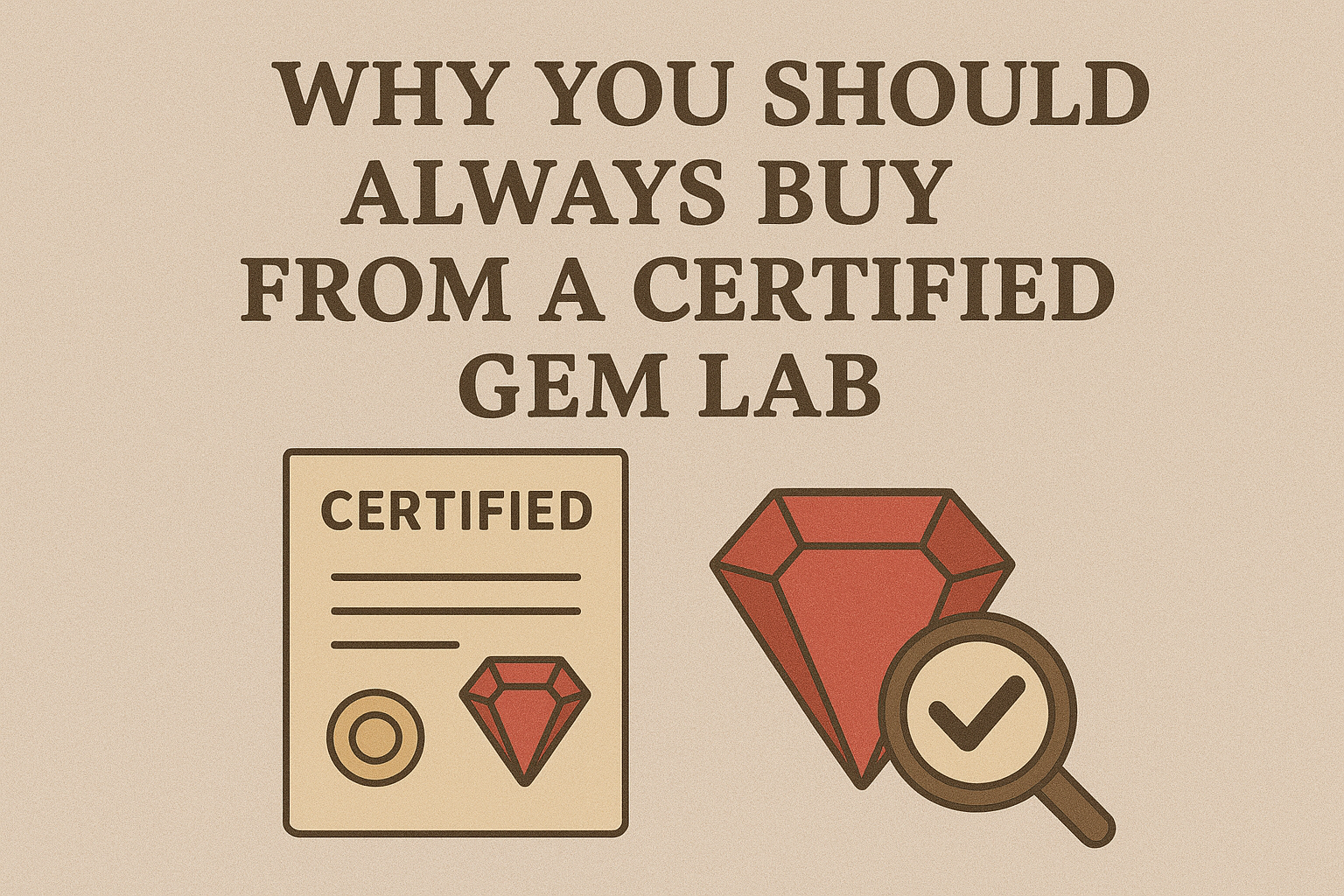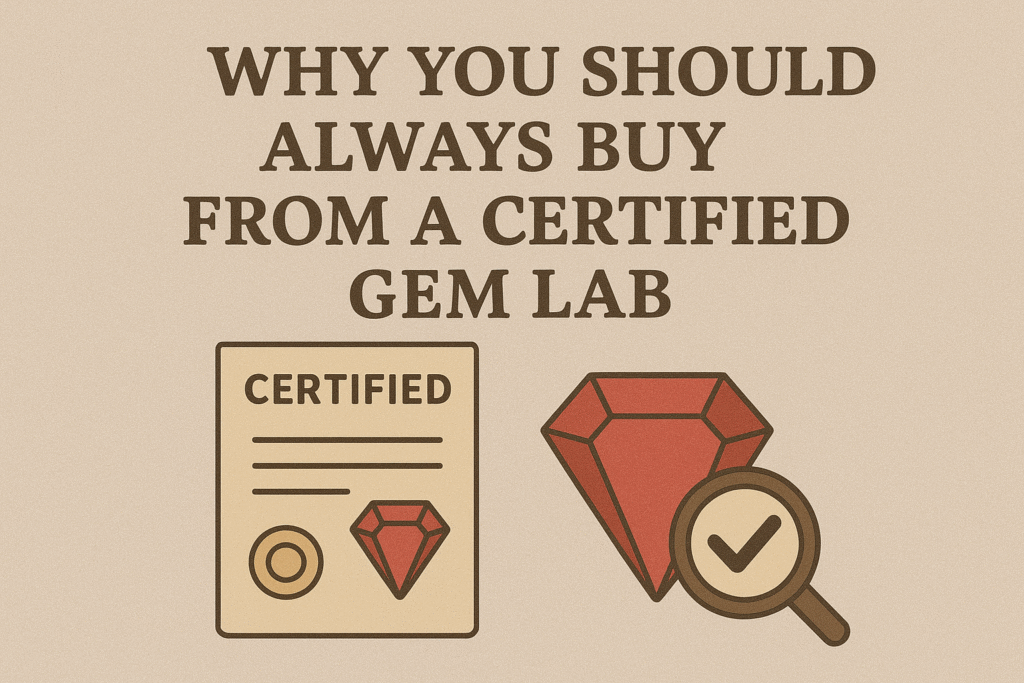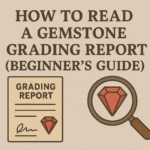Imagine spending thousands of dollars on what you believe is a stunning natural sapphire, only to discover it’s a synthetic stone worth a fraction of the price. This nightmare scenario happens more often than you might think. In a market flooded with treated, synthetic, and imitation gemstones, the difference between a certified gem lab and an uncertified seller can mean the difference between a wise investment and an expensive mistake.
Whether you’re purchasing an engagement ring, building a gemstone collection, or investing in precious stones, understanding gemstone certification is no longer optional—it’s essential. This comprehensive guide will explain exactly why buying from a certified gemological laboratory should be your non-negotiable standard, and how proper certification protects both your wallet and your peace of mind.
By the end of this article, you’ll understand the science behind gemstone grading, recognize the most trusted certification bodies worldwide, and know exactly what to look for on a gemstone certificate. Let’s dive into everything you need to know about certified gem labs.
What Is a Certified Gem Lab?
A certified gem lab, also known as a gemological laboratory, is an independent institution that specializes in analyzing, grading, and authenticating gemstones. These facilities employ trained gemologists who use advanced scientific equipment to evaluate precious and semi-precious stones according to standardized criteria.
Unlike jewelry retailers or dealers who may have financial incentives to overstate a stone’s quality, certified labs provide unbiased, third-party assessments. Their sole purpose is to deliver accurate, objective reports about a gemstone’s characteristics, origin, and any treatments it may have undergone.
The Role of Gemological Laboratories in the Jewelry Industry
Gemological laboratories serve as the backbone of trust in the global gemstone market. They establish and maintain the standards by which all gemstones are evaluated. Without these institutions, buyers and sellers would have no common language to describe gem quality, and the market would be rife with fraud and misrepresentation.
These labs continuously research and develop new testing methods to keep pace with increasingly sophisticated synthetic and treated stones. As technology advances, so do the techniques used to create artificial gems that can fool the untrained eye—and even some basic testing methods.
Top Reasons to Buy from a Certified Gem Lab

Purchasing gemstones through certified laboratories offers numerous advantages that directly impact your buying experience and long-term satisfaction. Here are the most compelling reasons to insist on certification.
Guaranteed Authenticity and Natural Origin Verification
The primary function of gem certification is to confirm that a stone is genuine. Certified labs can distinguish between natural gemstones, laboratory-created synthetics, and imitation materials using specialized equipment including spectroscopes, refractometers, and microscopes.
Advanced techniques such as FTIR (Fourier Transform Infrared Spectroscopy) and Raman spectroscopy allow gemologists to identify the chemical composition and crystal structure of stones with precision. This scientific approach eliminates guesswork and provides concrete evidence of a stone’s authenticity.
Accurate Quality Grading and Fair Market Pricing
Certified gem labs grade stones according to internationally recognized standards, typically evaluating color, clarity, cut, and carat weight—the famous “Four Cs.” For colored gemstones, additional factors like saturation, tone, and hue distribution are assessed.
This standardized grading directly correlates to market value. When you purchase a certified gemstone, you can compare its specifications to market prices and ensure you’re paying a fair amount. Without certification, you’re essentially trusting a seller’s subjective opinion—which may or may not align with industry standards.
Full Treatment Disclosure and Enhancement Detection
Many gemstones undergo treatments to enhance their appearance. Heat treatment, fracture filling, irradiation, and diffusion are common practices that can significantly affect a stone’s value. Certified labs detect and disclose all treatments, ensuring buyers understand exactly what they’re purchasing.
For example, an untreated natural ruby may be worth several times more than an identical-looking heat-treated stone. Without professional laboratory analysis, identifying these treatments is virtually impossible for the average buyer—or even many jewelers.
Investment Protection and Resale Value
Certification documents provide permanent proof of a gemstone’s quality characteristics. This documentation is essential for insurance purposes and becomes invaluable if you ever decide to sell or upgrade your stone. Certified gemstones consistently command higher prices in the secondary market because buyers can verify their quality independently.
Think of certification as a gemstone’s passport—it travels with the stone throughout its lifetime, providing an objective record that maintains and often increases its market value.
World’s Most Trusted Gem Certification Laboratories
Not all certification laboratories carry equal weight in the gemstone industry. The following institutions have earned global recognition for their accuracy, consistency, and rigorous standards.
| Laboratory | Headquarters | Specialty | Recognition |
| GIA | USA | Diamonds & Colored Stones | Global Standard |
| AGS | USA | Diamond Cut Quality | Highly Respected |
| Gübelin | Switzerland | Colored Gemstones | Premium Authority |
| SSEF | Switzerland | Origin Determination | Premium Authority |
| Lotus Gemology | Thailand | Asian Gemstones | Regional Expert |
GIA: The Gemological Institute of America
Founded in 1931, GIA is widely considered the world’s foremost authority on gemstone grading. The institute created the International Diamond Grading System and the Four Cs concept that are now used worldwide. GIA certificates are accepted by virtually every jeweler, auction house, and insurance company globally.
GIA operates as a nonprofit organization, which reinforces its commitment to unbiased, objective grading. Their reports are known for conservative, consistent grading standards, making them particularly valuable for high-stakes purchases.
AGS: American Gem Society Laboratories
AGS is particularly renowned for its advanced light performance grading, especially for diamonds. Their proprietary cut grading system is considered by many experts to be the most sophisticated in the industry, utilizing angular spectrum analysis to evaluate how well a diamond handles light.
For buyers primarily concerned with brilliance and fire, AGS certification offers unparalleled insight into a diamond’s optical properties.
How to Read and Understand a Gem Certification Document
A gem certificate contains detailed technical information that can seem overwhelming at first glance. Understanding these documents empowers you to make informed purchasing decisions.
Key Elements Found on Every Certificate
- Report Number: A unique identifier that allows verification of authenticity through the lab’s database
- Date of Issue: When the examination was conducted
- Shape and Cutting Style: The stone’s basic form (round, oval, emerald cut, etc.)
- Measurements: Precise dimensions in millimeters
- Carat Weight: The stone’s weight, measured to the hundredth of a carat
- Color Grade: Assessment of the stone’s color (varies by gemstone type)
- Clarity Grade: Evaluation of internal inclusions and external blemishes
- Treatment Disclosure: Any enhancements or treatments detected
- Origin Determination: Geographic source (when determinable)
How to Verify Certificate Authenticity Online
Every reputable certification laboratory maintains an online verification system. Before finalizing any purchase, you should independently verify the certificate using the issuing lab’s website. Simply enter the report number to confirm the document’s authenticity and view the original grading results.
Be cautious of certificates that cannot be verified online, or those from laboratories you’ve never heard of. Fraudulent certificates do exist, and verification is your first line of defense against deception.
Certified vs. Uncertified Gemstones: What’s the Real Difference?
Understanding the distinction between certified and uncertified gemstones is crucial for making smart purchasing decisions.
| Factor | Certified Gemstones | Uncertified Gemstones |
| Authenticity | Scientifically verified | Seller’s claim only |
| Quality Grading | Standardized system | Subjective opinion |
| Treatment Info | Fully disclosed | Often unknown |
| Resale Value | Higher & easier to sell | Difficult to value |
| Insurance | Easy to insure | May require appraisal |
| Price Transparency | Market-based pricing | Arbitrary pricing |
Common Gemstone Treatments That Certified Labs Detect
Understanding common treatments helps you appreciate why laboratory analysis is so valuable. Here are the most prevalent enhancement methods used in the gemstone industry.
Heat Treatment
The most common treatment across all gemstone types, heat treatment permanently alters a stone’s color and clarity. While widely accepted for many gems (particularly sapphires and rubies), it significantly affects value. Untreated stones of equivalent visual quality typically sell for two to ten times more than their heated counterparts.
Fracture Filling
This treatment involves filling surface-reaching fractures with glass, resin, or oil to improve apparent clarity. Fracture filling is generally considered a less stable treatment and can be damaged by heat, ultrasonic cleaning, or certain chemicals. Proper disclosure is essential as this treatment requires special care.
Beryllium Diffusion
A sophisticated treatment primarily used on sapphires, beryllium diffusion introduces color-causing elements into a stone at extremely high temperatures. This treatment can dramatically improve color but significantly reduces value. Detection requires specialized laboratory equipment.
Red Flags to Watch For When Buying Gemstones
Protect yourself from fraud by watching for these warning signs during your gemstone purchasing journey.
- Prices that seem too good to be true — Quality gemstones have established market values
- Reluctance to provide certification — Legitimate sellers welcome independent verification
- Certificates from unknown laboratories — Stick to recognized, reputable institutions
- Pressure tactics or urgency — Quality gemstones deserve careful consideration
- Vague or missing treatment disclosures — Professional sellers always provide this information
- No return policy — Reputable dealers stand behind their products
Step-by-Step Guide to Buying Certified Gemstones
Follow this systematic approach to ensure a safe and satisfying gemstone purchase.
Step 1: Define Your Requirements
Determine your budget, preferred gemstone type, and intended use (jewelry, collection, investment). Research typical price ranges for your desired quality level to establish realistic expectations.
Step 2: Select a Reputable Seller
Choose dealers who specialize in certified gemstones and have established reputations. Look for membership in professional organizations and verify their track record through reviews and references.
Step 3: Request Certification
Always request stones that come with certificates from recognized laboratories. If purchasing online, ensure the certificate accompanies the gemstone and can be verified independently.
Step 4: Verify the Certificate
Before finalizing your purchase, verify the certificate’s authenticity through the issuing laboratory’s online database. Confirm that the described characteristics match the stone you’re considering.
Step 5: Complete Your Purchase with Protection
Use secure payment methods that offer buyer protection. Ensure you receive the original certificate along with your gemstone, and consider having the stone independently appraised for insurance purposes.
The Future of Gem Certification and Laboratory Technology
The gemstone certification industry continues to evolve with advancing technology. Artificial intelligence and machine learning are now being integrated into grading systems, potentially increasing consistency and reducing human error.
Blockchain technology is also emerging as a tool for creating immutable records of a gemstone’s history, from mine to market. This “digital passport” concept could revolutionize how provenance and authenticity are verified in the future.
As synthetic gemstone technology improves, laboratory detection methods must advance correspondingly. The ongoing investment in research and development by major certification labs ensures they remain capable of distinguishing natural from synthetic stones—a critical service in maintaining market integrity.
Conclusion: Your Path to Confident Gemstone Purchases
Buying gemstones without proper certification is simply not worth the risk. Certified gem labs provide the objective verification, accurate grading, and treatment disclosure that protect your investment and ensure you receive exactly what you pay for.
Whether you’re purchasing your first gemstone or adding to an established collection, always insist on certification from recognized laboratories like GIA, AGS, Gübelin, or SSEF. The small additional investment in certified stones pays dividends in authenticity assurance, accurate valuation, and long-term resale value.
Take action today: before your next gemstone purchase, research the certification laboratories mentioned in this guide, familiarize yourself with reading gem certificates, and commit to buying only certified stones. Your future self—and your gemstone collection—will thank you for it.
Frequently Asked Questions About Certified Gem Labs
How much does gemstone certification typically cost?
Certification costs vary depending on the laboratory and type of stone. Basic diamond grading from major labs typically ranges from $50 to $200, while comprehensive colored gemstone reports with origin determination can cost $200 to $500 or more. The cost is generally proportional to the complexity of analysis required.
Can a gemstone’s certification be forged or falsified?
While fake certificates do exist, reputable laboratories use multiple security features including unique report numbers, QR codes, holograms, and online verification systems. Always verify any certificate through the issuing laboratory’s official website before making a purchase.
Should I get a gemstone re-certified if I inherited jewelry?
Re-certification is advisable for inherited pieces, especially valuable ones. Grading standards may have changed since the original certification, and you’ll want current documentation for insurance purposes. Additionally, having an updated certificate confirms the stone hasn’t been substituted or altered.
Do all gemstones need the same type of certification?
Different gemstones require different evaluation criteria. Diamonds are typically graded on the 4Cs (cut, color, clarity, carat), while colored gemstones emphasize color quality, origin, and treatment status. Some laboratories specialize in certain gem types, so choose a lab with expertise in your specific stone.
Is a locally-certified gemstone as trustworthy as one certified by international labs?
Local certification can be reliable if the laboratory maintains strict standards and employs qualified gemologists. However, internationally recognized labs like GIA or SSEF typically offer greater market acceptance and easier resale value verification. For significant purchases, international certification is recommended.







